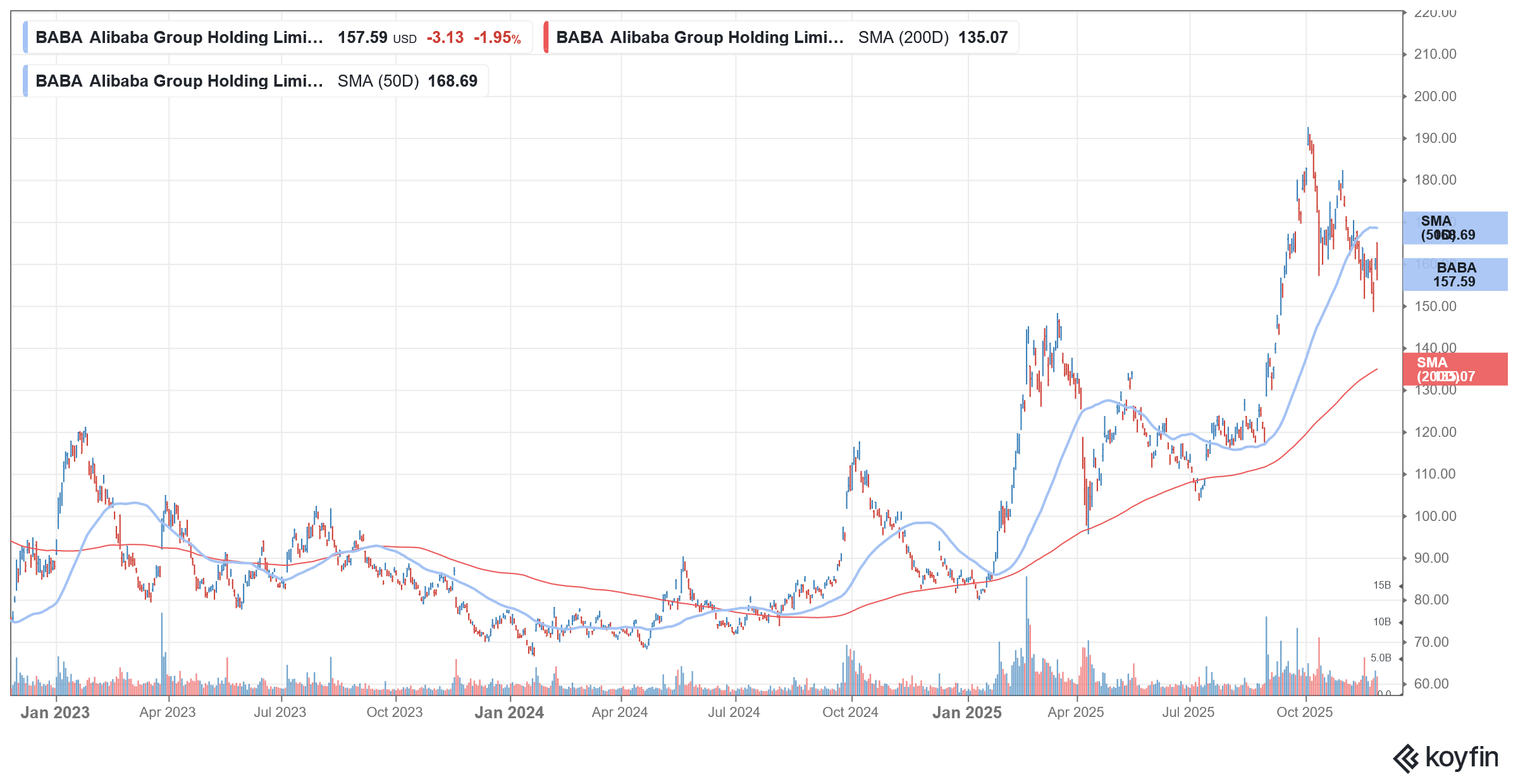
Alibaba (NYSE: BABA) shares are trading lower in price action after the Chinese tech company posted mixed earnings for the September quarter. Here are the key takeaways from the report.
Alibaba reported revenues of RMB 247.8 billion (approximately $34.8 billion) in its fiscal Q2 2026, which was 5% higher year-over-year and ahead of the RMB 242.65 billion that analysts had modelled. On a like-for-like basis, excluding revenue from disposed businesses, the underlying revenue growth was a more robust 15%, highlighting the strength of its core operations.
In his prepared remarks, Alibaba’s CFO Toby Xu said, “Our core businesses continued to deliver solid revenue growth, with AI revenue contributing to an expanding share of our cloud revenues from external customers, and customer management revenue up 10%.”
Alibaba reported better-than-expected revenues in Q2
The Cloud Intelligence Group was the clear star of the quarter, with revenue growth accelerating to an impressive 34% year-over-year. This momentum was almost entirely fueled by AI-related products, which achieved triple-digit revenue growth for the ninth consecutive quarter, driven by robust demand for high-performance computing and the rapid adoption of Alibaba’s foundational models like Qwen. The company disclosed that it has deployed approximately RMB 120 billion toward AI and cloud infrastructure over the past year, underscoring its commitment to becoming a global leader in the AI stack. The blockbuster launch of its redesigned Qwen AI application, which rapidly surpassed 10 million downloads, further solidified the success of this strategic direction.
Alibaba’s CEO Eddie Wu said that demand for AI products is “accelerating,” while adding, “Certainly, we see that customer demand for AI is and remains very strong. In fact, we are not even able to keep pace with the growth in customer demand.” He also touted the possibility of increasing the AI capex to meet customer demand.
Rising AI capex has made investors apprehensive
In the US as well, tech giants have raised their 2025 capex guidance, with Meta Platforms and Microsoft saying that the growth rate would be even higher next year. However, the spending spree is also raising concerns over a possible bubble, as some believe that tech companies won’t be able to generate enough returns to justify the billions of dollars that are being spent on building AI infrastructure.
Alibaba is betting on instant commerce
Meanwhile, Alibaba’s core China E-commerce Group (Taobao and Tmall) demonstrated stability, with Customer Management Revenue growing by 10%, primarily due to an improved merchant take rate. The company is actively integrating its quick commerce (instant delivery) services into the main shopping experience to enhance user engagement and capture market share in high-frequency daily consumption, a factor that contributed to both revenue growth and the pressure on short-term profitability.
BABA’s profits tank
Alibaba’s adjusted net income fell by over 70% year-over-year in part due to losses in the instant commerce business and growing AI capex. Chief Executive Officer Eddie Wu stated that this was a deliberate decision, noting that the company has fully entered an “investment phase” focused on building long-term strategic value in AI technologies and infrastructure. This investment push also resulted in an outflow of free cash flow, primarily due to high capital expenditure in cloud infrastructure and quick commerce.
Alibaba Is Positioning Itself as an AI Play
Meanwhile, Alibaba is aggressively transforming itself from a dominant e-commerce player into an AI-first technology leader, focusing on a full-stack approach that encompasses the development of custom chips, powerful foundation models, and a suite of cloud services to deliver AI capabilities to enterprises and consumers.
This pivot is strategic, driven by the massive potential of Generative AI and the need for technological self-reliance amid geopolitical concerns and export restrictions on advanced foreign chips. The company has committed to a multi-billion-dollar investment over the next few years to execute this strategy.
Among others, it has developed an AI chip, which is a strategic response to US export restrictions that limit access to the most advanced AI chips, such as those from Nvidia. Alibaba, like other Chinese tech giants, is increasingly using its own chips for training AI models, a crucial step toward semiconductor independence.
Chips are the bedrock of AI infrastructure
The strategic importance of semiconductors has increased as they are used in the production of many goods, ranging from cars to gadgets. The COVID-19 pandemic exposed the vulnerabilities in the global supply chain, and since then, several countries have been looking to onshore ship production.
As a cornerstone of the AI boom, semiconductors have surged in strategic importance. This rise, coupled with escalating geopolitical tensions, has placed a spotlight on the technological advantages of key players in the chip supply chain, such as TSMC and other industry leaders.
The Biden administration imposed restrictions on exports of advanced AI chips to China, fearing their dual military use. The Trump administration tightened the screws after it restricted the exports of Nvidia’s H20 chips that the company had specifically designed for China.
While Nvidia now has the approval to sell the chips to China, its sales have failed to take off as the Communist country has cautioned domestic companies against using Nvidia chips over potential “backdoors” – an allegation the US chip designing giant has denied.
Meanwhile, the chip export restrictions prompted Chinese companies like Alibaba to innovate and develop their own chips, something Nvidia CEO Jensen Huang has long been warning.


Question & Answers (0)